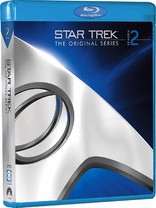Star Trek: The Original Series: Season 2 Blu-ray Movie
HomeStar Trek: The Original Series: Season 2 Blu-ray Movie 
Paramount Pictures | 1967-1968 | 1314 min | Not rated | Sep 22, 2009Movie rating
8.6 | / 10 |
Blu-ray rating
| Users | 4.8 | |
| Reviewer | 5.0 | |
| Overall | 4.8 |
Overview
Star Trek: The Original Series: Season 2 (1967-1968)
Space. The Final Frontier. The U.S.S. Enterprise embarks on a five year mission to explore the galaxy. The Enterprise is under the command of Captain James T. Kirk. The First Officer is Mr. Spock, from the planet Vulcan. The Chief Medical Officer is Dr. Leonard \'Bones\' McCoy. With a determined crew, the Enterprise encounters Klingons, Romulans, time paradoxes, tribbles and genetic supermen lead by Khan Noonian Singh. Their mission is to explore strange new worlds, to seek new life and new civilizations, to boldly go where no man has gone before.
Starring: William Shatner, Leonard Nimoy, DeForest Kelley, Nichelle Nichols, James DoohanDirector: Vincent McEveety, Marc Daniels, Joseph Pevney, Ralph Senensky, Jud Taylor
| Sci-Fi | Uncertain |
| Adventure | Uncertain |
| Action | Uncertain |
Specifications
Video
Video codec: VC-1
Video resolution: 1080p
Aspect ratio: 1.33:1
Original aspect ratio: 1.33:1
Audio
English: DTS-HD Master Audio 7.1 (48kHz, 24-bit)
English: Dolby Digital 2.0 Mono (192 kbps)
French: Dolby Digital 2.0 Mono (192 kbps)
Spanish: Dolby Digital 2.0 Mono (192 kbps)
Subtitles
English SDH, French, Portuguese, Spanish
Discs
50GB Blu-ray Disc
Seven-disc set (7 BDs)
BD-Live
Packaging
Slipcover in original pressing
Playback
Region free
Review
Rating summary
| Movie | 5.0 | |
| Video | 4.5 | |
| Audio | 4.5 | |
| Extras | 4.5 | |
| Overall | 5.0 |
Star Trek: The Original Series: Season 2 Blu-ray Movie Review
Boldly go and add this superb release to your Blu-ray collection.
Reviewed by Martin Liebman September 13, 2009Its five-year mission: to explore strange new worlds, to seek out new life and new
civilizations.
Reviewer's log, stardate 092009.13.
The second season of 'Star Trek' -- one of television's most cherished programs of all time and the
precursor to an additional five television series and eleven feature-length films -- arrives on
Blu-ray
with high expectations to meet or surpass the lofty standards set by the first season's incredible
Blu-ray release. It should
come as no surprise that season two picks up exactly where its predecessor left off, boasting a
wonderful array of quality episodes presented with gorgeous 1080p transfers, full-fledged DTS-HD
MA 7.1
lossless soundtracks, and plenty of bonus features. Arguably the most important of any Star
Trek
season throughout the franchise's entire 29-season run, season two of the Original Series set the
stage for a
myriad of themes, story lines, and characters that would find their way into Star Trek lore in the
40
years after the season's original television debut on September 15, 1967.
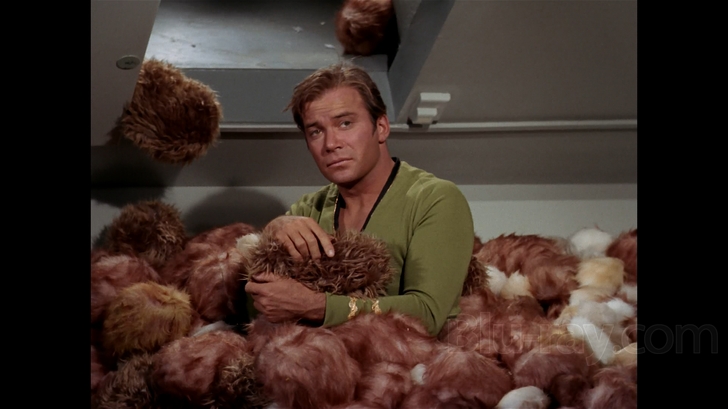
Now that's a swarm...
Superficially, this season's most obvious contribution to "Star Trek" lore lies in the introduction of Pavel Chekov (portrayed by Walter Koenig) as a primary cast member. Arguably debuting too late in the series' run, his absence in the season one episode "Space Seed" but integral role in the history of Eugenics War villain Khan Noonien Singh as seen in the 1982 filmed sequel The Wrath of Khan represents one of Star Trek's most glaring inconsistencies, perhaps the only flaw to be found in an otherwise perfect Star Trek movie. As to his role in the series, Chekov's presence represents a continuation of creator Gene Roddenberry's vision of a utopian future where humanity was no longer divided by racial, cultural, ethnic, political, or religious lines. The Russian character joined the cast at the height of the Cold War, the world less than five years removed from the Cuban Missile Crisis. Chekov is also the most nationalistic of the primary cast of characters; often proclaiming his love and adoration for "Mother Russia," downing Vodka on occasion, and boasting of his nation's accomplishments both real and imagined, Pavel displays a love of country that surpasses even that of Chief Engineer Scott. Chekov also represents a comic relief of sorts in both season two of Star Trek and in the season and movies to follow that often stem from his national pride, oftentimes excessive bragging on the accomplishments of his native land and, of course, his thick accent.
More importantly, season two of Star Trek represents the series' greatest achievement and arguably the single most important season of Star Trek to be found amongst the entire canon. Though not as fascinating as several of the later "Star Trek: Deep Space Nine" seasons or boasting the most consistently excellent selection of episodes as seen in the fifth season of "Star Trek: The Next Generation," the original series' second season nevertheless features an array of episodes that set the stage for several items crucial to Star Trek lore. "Amok Time" introduces audiences to some of the more intricate details of life on Vulcan, and the "Pon Farr" would at least twice later enter into Star Trek plot lines, in both Star Trek III: The Search for Spock and later in an episode of "Star Trek: Voyager." The plot of "Changeling" -- a scientific probe of Earth origins altered to destroy with immense power -- is eerily similar to that of Star Trek: The Motion Picture. Parallel universes are a staple of Star Trek, and the "mirror universe" earned its first entry in the aptly-titled "Mirror, Mirror," a story line that would later be integrated as an on-again, off-again story arc throughout Star Trek: Deep Space Nine and, later in real time but earlier in the Star Trek timeline, in "Enterprise." Zefram Cochrane, the man credited with developing the warp drive on Earth and, by extension, making Star Trek possible, makes his on-screen debut in "Metamorphoses" and, some years later, plays central to the story line of Star Trek: First Contact. Vulcan Ambassador Sarek, another character crucial to Star Trek and appearing in several films and television episodes, including the notable Star Trek: The Next Generation two-part season five entry "Unification," makes his debut in "Journey to Babel;" Sarek is portrayed by actor Mark Leonard throughout Star Trek until being replaced with an appropriately younger Ben Cross in 2009's reboot, Star Trek. Another staple of Star Trek are episodes that place various members of the crew amidst a culture mimicking that of Earth's past, a plot line that's central to two of this season's best episodes, "A Piece of the Action" and "Patterns of Force." Though later series often used the holodeck to replace actual civilizations, the idea is nevertheless one that finds its roots -- and two of its finest hours -- right here. Last but not least, season two of Star Trek features the most-loved episode of them all, "The Trouble With Tribbles." Featuring the franchise's best-known non-humanoid species, making for its funniest episode, and serving as the inspiration for the highly-innovative Star Trek: Deep Space Nine episode "Trials and Tribble-ations" that stands as one of that show's finest hours to be found outside the Dominan War story arc (along with "Take Me Out to the Holosuite"), "Tribbles" is simply Star Trek at its finest.
Season Two highlight episodes include, but are not limited to:
Episode One, "Amok Time"
Stardate 3372.7. Dr. McCoy notices his friend and colleague, Mr. Spock, acting strangely. The Vulcan isn't eating, and when his temper flares up in front of Captain Kirk, he sharply requests a leave of absence from the Enterprise. Without divulging why he needs to return home or what it is that has him on edge, Kirk agrees to alter course to Vulcan for the sake of his old friend, trusted confidant, and skilled first officer. En route, the Enterprise receives a priority communiqué from Starfleet stating that their previous mission to Altair VI has been advanced by seven days, leaving Kirk with no choice but to negate the course change to Vulcan. Spock ignores the new orders and, behind the captain's back, orders the ship once again to Vulcan. When confronted over the course change, Spock confides in Kirk that he is experiencing Pon Farr, the Vulcan time of mating that arrives once every seven years. He must return home to take a wife -- or die. Nevertheless, Starfleet gives Kirk strict orders to remain on course to Altair VI, which Kirk ignores. The Vulcan invites Captain Kirk and Dr. McCoy to accompany him to the surface, a decision that ultimately threatens to tear best friends apart -- forever.
Episode Three, "The Changeling"
Stardate 3541.9. An object of massive weight but miniscule size approaches the Enterprise from the Malurian system at high speed, and the ship comes under heavy attack by the powerful and unknown force that vastly outguns, outruns, and outmaneuvers the Federation vessel. The Enterprise crew receives a mathematical binary code from the vessel in an attempt to communicate. When a dialogue is finally established, the Enterprise crew learns that the enemy calls itself "Nomad." It is brought aboard and wishes to learn more about humanity's point-of-origin. Nomad identifies Kirk as "the creator" that sent it out into space in the early 2000s, though that man was actually Jackson Roykirk, a brilliant yet unstable scientist of the past that sought to build an intelligent artificial life form. Nomad, previously damaged and subsequently repaired and reprogrammed, believes its function now to be the sterilization of unstable biological entities and admits to wiping out the population of the Malurian system and verbalizes its intent to destroy the crew of the Enterprise and, eventually, Earth itself.
Episode Four, "Mirror, Mirror"
Stardate unknown. The Halkan council will not allow the Federation to mine for Dilithium crystals on their planet; they are worried that if even one person were to die in conflict as a result of a ship powered by their crystals, their perfectly peaceful history would be forever upset. Returning to the ship via transporter during a storm, Kirk, McCoy, Uhura, and Scotty materialize in a mirror universe where the Enterprise is a warship with a mission of force rather than peace. "The Empire" -- having replaced the Federation -- is an evil entity and routinely punishes crew that don't perform their duties to a sufficient degree of excellence, and places mutinous officers that seek to assassinate senior officers with the goal of instant promotion into "the agony booth." Kirk's refusal to show force against the Halkans brings from Spock a warning: follow Empire regulations or die. Meanwhile, the alternate Kirk, McCoy, Uhura, and Scotty find themselves on the real Enterprise, believing they are at the hands of an ambitious Mr. Spock that seeks to surreptitiously take command of the ship.
Episode Six, "The Doomsday Machine"
Stardate unknown. The Enterprise receives a distress call; the garbled message allows only the world "constellation" to be deciphered. Ship's sensors show the entire solar system from whence the call originated to be destroyed. Soon thereafter, the ship's sensors pick up a vessel, the badly damaged and adrift Constellation under the command of Commodore Matt Decker. Kirk, Scotty, McCoy, and a damage assessment team beam over and find no sign of humanity, living or dead. Soon enough, however, the boarding party stumbles upon a disheveled and dazed Decker who claims his ship was attacked by a "devil." Spock hypothesizes the attacker to instead be a robot of immense size and power that destroys planets and digests their remnants for fuel. Kirk believes it to be a "doomsday machine" created years ago to win a war, but has long since wandered from its original purpose and gone on to devastate the galaxy. With Captain Kirk still aboard the Constellation and against Spock's better judgment, Decker assumes command of the Enterprise with the purpose of taking on the machine yet again in what the crew believes to be a suicidal effort.
Episode Eight, "I, Mudd"
Stardate 4513.3. A new crew member strikes Dr. McCoy as odd, and for good reason. He initiates an unauthorized course change and assumes total control of the Enterprise. He's an android and is not programed to respond to inquiries as to his origins or who sent him to commandeer the Federation vessel. Upon arrival to the mysterious destination, he orders Kirk, Spock, McCoy, Uhura, and Chekov to the surface. There, they meet an old friend -- Harcourt Fenton Mudd -- reigning over a planet of androids. He's constructed an army of androids that serve his beck and call, beaming them up to the Enterprise and, in turn, beaming the crew down to the surface in an effort to commandeer the vessel and leave the crew -- some of whom are beginning to enjoy their stay and the future it promises -- on the planet.
Episode Nine, "Metamorphosis"
Stardate unknown. Onboard a shuttlecraft, Captain Kirk; Mr. Spock; Dr. McCoy; and a guest, Assistant Federation Commissioner Nancy Hedford; find an object hurtling towards them at warp speed. Hedrord suffers from a medical condition that requires her to receive treatment onboard the Enterprise immediately. However, the shuttle is diverted to a nearby planet where the crew meets a man claiming to be Dr. Zefram Cochrane, inventor of the warp drive on Earth some years ago. His story checking out, Cochrane claims to have been brought to the planet by an entity he calls "the Companion" who rejuvenated his aging body and once again made him young and healthy. Kirk, Spock, and Bones must attempt to understand the Companion and its relationship with Cochrane if they are to ever leave the planet and get Miss Hedford the medical treatment she requires.
Episode Ten, "Journey to Babel"
Stardate 3842.3. The Enterprise receives Vulcan ambassador Sarek -- who is also Spock's father -- to oversee a crucial peace conference. A small ship approaches the Enterprise but remains only on the edge of sensor range. As the negotiations heat up in an informal setting, a Tellarite attempts to physically harm Sarek, though Kirk breaks up the fight before it begins. The Tellarite ambassador is found murdered shortly thereafter using a Vulcan method, making Ambassador Sarek a suspect. His defense: meditation in solitude at the time of the murder. Lieutenant Uhura surmises that someone on board the Enterprise may be receiving a coded transmission from the ship that's shadowing the Federation vessel. While the crew attempts to discover the identity of the assassin, Sarek falls ill and must undergo a dangerous operation to save his life.
Episode Fourteen, "Wolf in the Fold"
Stardate 3614.9. Scotty, Kirk, and McCoy are enjoying shore leave on a hedonistic planet. Mr. Scott, the victim of a recent head injury, is drawn to a belly dancer's charming ways. He and the dancer depart into the foggy streets of Argellius II where she is soon found dead -- stabbed a dozen times -- and Scotty's holding the murder weapon. The people of the planet wish to use an ancient truth-seeking technique to discover whether or not he actually murdered the woman, while Kirk and McCoy want to have a special forensics team with a "psycho-tricorder" beamed down. No sooner does the Starfleet officer begin her examination of Mr. Scott -- in private -- is she founded murdered with Scotty passed out in the same room. As events unfold and yet another woman is killed, new evidence and new suspects emerge, casting a shadow of a doubt on Mr. Scott's guilt, despite the seemingly clear-cut case being built against him.
Episode Fifteen, "The Trouble With Tribbles"
Stardate 4523.3. The Enterprise is en route to deep space station K-7. The quadrant in which it lies is under dispute between the Klingons and the Federation, with the claim on Sherman's Planet in the middle of the upheaval. K-7 sends a priority one distress call that signifies it to be under heavy attack. The Enterprise responds ready for battle and at red alert, but they arrive to find the station appearing to be in a relative state of peace. They have been summoned to guard "quadrotriticale," the only form of grain that will grow on Sherman's Planet. Mr. Niz Baris, the Federation's Undersecretary of Agriculture, fears attack on the supply, a move that would significantly weaken the Federation's claim on the planet. Just as Kirk is ordered to lend full cooperation to the task of securing the grain's safety, a Klingon warship arrives at the station. Claiming to be at the station for shore leave, the Klingons are granted a small contingent on the station, their number to be matched by Starfleet security personnel. Meanwhile, Lt. Uhura falls in love with a small, cuddly creature known as a "Tribble." She brings the creature aboard the Enterprise only to find it reproducing at an alarming rate. Though the creature seems to be of no benefit, its unwanted presence nevertheless leads Kirk and Spock to discover the identity of a saboteur aboard K-7.
Episode Seventeen, "A Piece of the Action"
Stardate 4598.0. "Boss" Okmyx calls the Enterprise from the surface of his home planet. The U.S.S. Horizon had 100 years earlier interfered with the planet and contaminated their culture, a culture that's described as being highly imitative. Kirk, Spock, and McCoy beam down to find a city that seems to be the mirror image of 1920s Earth and are greeted by a pair of Gangsters wielding Tommy Guns. Spock soon finds a copy of Chicago Mobs of the Twenties, an Earth book circa 1990 that was accidentally left behind by a member of the Horizon crew. Okmyx wants Kirk to supply him with "heaters," or phasers, in hopes of using them to wipe out his rivals for good. When Kirk is kidnapped by men working for JoJo Krako -- Okmyx's rival -- he offers the Enterprise captain "a piece of the action," or one-third of his take, for helping him gain absolute control. Kirk refuses and subsequently finds himself playing both sides and playing the role of a suave 1920s gangster in hopes of peacefully resolving the conflict.
Episode Eighteen, "The Immunity Syndrome"
Stardate 4307.1. Lt. Uhura receives a garbled transmission from Starbase six leading the Enterprise to search for the Intrepid, a Vulcan-crewed vessel. Suddenly, Spock -- Obi-Wan Kenobi style -- senses that the ship has been destroyed, and all 400 hands aboard lost. When communications are more firmly established with Starfleet, the Enterprise is ordered to sector 3-9-J for a rescue priority mission. Chekov's sensors detect the entire Gamma system -- home to billions -- to be destroyed. Soon thereafter, the Enterprise encounters what appears to be a hole in space, lying on the exact course charted to find the Intrepid and assess the remains of the Gamma system. Suddenly, half the crew falls ill when a piercingly loud scan penetrates the ship. A second attack leaves more of the crew injured and the Enterprise inside a starless void where everything seems to be working in reverse. Meanwhile, McCoy surmises that everyone aboard the ship is dying. As they fight their own pending deaths, the crew must figure out what destroyed the Intrepid and the entire Gamma system while simultaneously attempting to escape the void and save the Enterprise, a problem that leaves Kirk with an impossible choice.
Episode Twenty-One, "Patterns of Force"
Stardate 2534.0. The Enterprise is searching for a man named John Gill, an Earth historian and a professor of Captain Kirk's at the Academy. A thermonuclear warhead -- a weapon generations more advanced than either the nearby Ekosians or Zeons should be capable of producing -- is launched at the Enterprise but is destroyed by the ship's phasers before it reaches its target. In disguise, Kirk and Spock beam down to the planet and find the Ekosians dressed as the soldiers of Nazi Germany from Earth's past. That same day, Kirk and Spock learn, the Führer -- John Gill -- has ordered the eradication of the Zeons. Attempting to pass themselves off as Nazi officers in hopes of locating Gill, Kirk and Spock are nevertheless discovered and subsequently tortured. They manage to escape and team up with the Zeon underground in an attempt to learn what has turned Gill into a monster and stop the eradication of the Zeons.
Star Trek: The Original Series: Season 2 Blu-ray Movie, Video Quality 
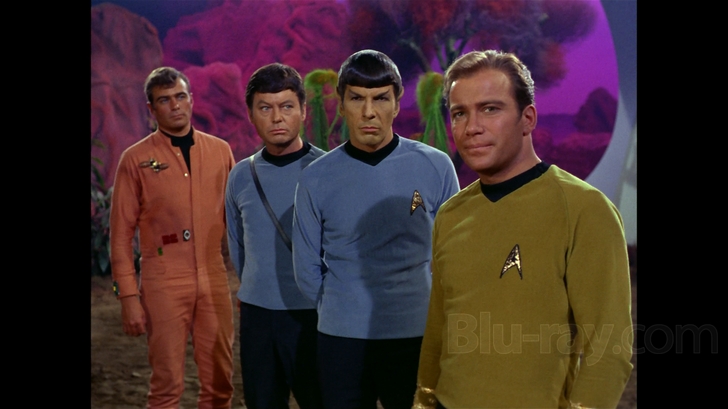
Season two of Star Trek beams onto Blu-ray with an expectedly stellar 1080p, 1.33:1-framed transfer that preserves the series' original broadcast aspect ratio and places vertical black bars on either side of the image when replayed on a 1.78:1 screen. Though it can a bit soft at times, seemingly a fault of the source and not the Blu-ray transfer, there's nary a moment where this presentations fails to absolutely impress. It boasts a moderately heavy layer of grain throughout; effects shots as seen in the non-remastered versions are in particularly rough shape, though given the source material and the composition of the original effects, there's no need to fault the transfer and the rough-around-the-edges look lends a charm to the proceedings that's absent from the remastered versions. Colors tend to jump off the screen with the natural appearance of every shade in the spectrum, highlighted by the mustard, red, and baby blue colors of the Starfleet uniforms. In addition, fine object detail is most impressive. Viewers will become privy to Spock's heavy make-up and the many beads of sweat that often appear on Dr. McCoy's face. A scar on Mirror Universe Sulu's face features an incredible amount of visible clarity and texture. Uniforms, too, are highly detailed; eagle-eyed viewers will see stitches, loose threads, a zipper that runs from the side of the neck and down, and even the faint residue of a Starfleet insignia patch that was removed on one particular red uniform in "Mirror, Mirror." The clarity afforded by the 1080p resolution even allows viewers to make out obvious stunt doubles in several long-distance action scenes. Blacks are generally solid but occasionally look a bit too bright, but flesh tones never veer too far from a natural shade. A small amount of shimmering and the occasional speckle of dirt are the only real hindrances to an otherwise out-of-this world transfer.
Star Trek: The Original Series: Season 2 Blu-ray Movie, Audio Quality 
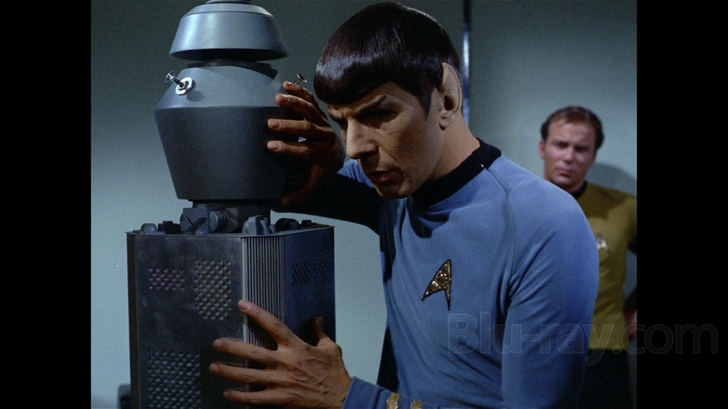
Star Trek: The Original Series -- Season Two warps onto Blu-ray with a glorious DTS-HD MA 7.1 lossless soundtrack. Listeners that choose to watch episodes with both the original and updated effects will note an enhanced soundtrack, too. While the non-remastered episodes sound fine, there's a clear upgrade to be heard in the enhanced versions. Sounds effects are fuller, more aggressive, and clearer in delivery. The remastered version also boasts a significantly greater sense of space and atmosphere. Listeners will often hear the hustle and bustle of the ship in the background as characters walk and talk about the bridge and Enterprise corridors, whether during calmer shots or more intense action sequences. Alarm klaxons blare in the background with startling precision, various explosions that rattle the ship pack a solid amount of low frequency information, and torpedos launched from the Enterprise reverberate through the listening area; listeners will not only hear them flying through the soundstage but also feel the effect of the projectiles as they hurtle towards their targets. Perhaps the fullest and most sonically active episode to be found amongst this collection is "The Doomsday Machine." The heavy device rumbles through space and its powerful weapon makes its presence felt each and every time it's discharged. The 7.1 track also improves upon the clarity of the show's famed opening credits theme, featuring crystal-clear musical reproduction through the entire dynamic range. Completed by flawless dialogue reproduction, season two of Star Trek delivers an audio presentation worthy of the high standard of Blu-ray and equals the superb 1080p video quality for sheer sensory delight.
Star Trek: The Original Series: Season 2 Blu-ray Movie, Special Features and Extras 
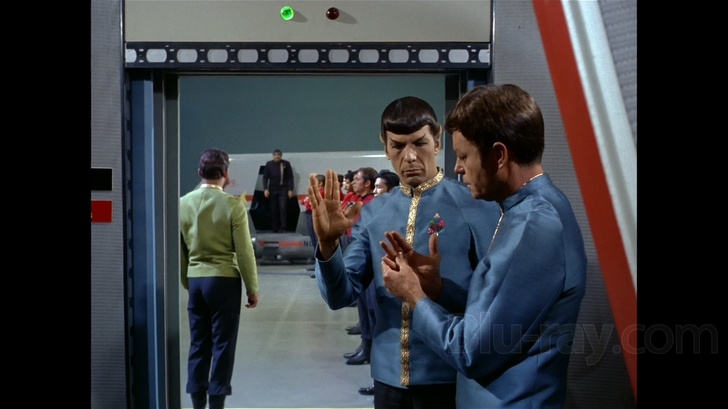
Each disc in this set contains bonus features, though some discs are far more feature-packed
than
others. Additionally, each episode is available for viewing with either original or
enhanced special effects. Below is a disc-by-disc breakdown of what's included.
Disc One
Disc one begins with Starfleet Access in conjunction with the episode "Amok Time." This
is
a picture-in-picture feature that offers an extensive background on the episode via video
commentary with various Star Trek crew members and historians. The piece also features
pop-up
trivia tidbits. Also included on this disc is Billy Blackburn's Treasure Chest (1080i,
12:07),
the second part of a collection of "rare home movies and special memories" as recorded on the
set
of Star Trek by the recurring background character. Along with numerous clips from the show,
Blackburn recalls his varied experiences on the set through many of the different episodes that
populate season two. Rounding out the special features on disc one are 480p previews for each
episode on the disc and BD-Live and Mobile-Blu functionality.
Disc Two
Only 480p previews for the episodes that appear on this disc and BD-Live and Mobile-Blu
functionality are included on this disc.
Disc Three
As with disc two, disc three features only 480p previews for the episodes that appear on this disc
and BD-Live and Mobile-Blu functionality.
Disc Four
Disc four is entirely devoted to Tribbles. "The Trouble With Tribbles" is the only original series
episode to be found on the disc, and available with it is a feature-length commentary track with
David Gerrold, writer of the famed episode. Also included is Starfleet Access, the
picture-in-picture commentary/trivia track. Perhaps the best feature on the disc is the inclusion
of two additional Tribble-related episodes: "More Tribbles, More Troubles" from "Star Trek: The
Animated Series," and "Trials and Tribble-ations" from Star Trek: Deep Space Nine. The former,
featuring David Gerrold commentary, is presented in 1080p high definition with a 1.33:1 aspect
ratio and a DTS-HD MA 7.1 lossless soundtrack. The episode runs for 24:13. The video and audio
quality are fantastic and bode well for a possible future Blu-ray release of the entire series.
Meanwhile, "Trials and
Tribble-ations" features a 1080i, 1.33:1 aspect ratio that, frankly, fares little-to-no-better than
the same episode's upscaled DVD counterpart. The episode does feature a DTS-HD MA 7.1
lossless soundtrack (the show's theme music, subjectively speaking the best ever to grace Star
Trek, sounds particularly wonderful). Trials and Tribble-ations: Uniting Two Legends
(480p, 16:53) takes viewers deep into the episode's concept. It features plenty of cast and crew
interview clips, behind-the-scenes footage, and segments from the completed episode. Trials
and Tribble-ations: An Historic Endeavor (480p, 16:32) is a similar piece that looks at how
the episode came about, focusing this time on the special effects that made the show work.
Star Trek: TOS on Blu-ray (1080p, 10:04), a piece featuring a panel of Niel R. Wray,
Denise and Michael Okuda, Dave Rossi, and later, Writer David Gerrold, delves into the
creation of the Blu-ray set and why it makes for an improvement over previous releases. Also
included is the 480p preview for "The Trouble With Tribbles."
Disc Five
'To Boldly Go...' Season Two (480p, 19:32) is a retrospective piece that looks back on
"The Trouble With Tribbles," Chekov's character, the stories behind "Amok Time" and "Mirror,
Mirror," how Star Trek integrated the issues of the 1960s into Science Fiction, and more. Also
included are the 480p previews for each episode on the disc and BD-Live and Mobile-Blu
functionality.
Disc Six
The primary supplement on disc six is Designing the Final Frontier (480p, 22:19), a look
at the set designs for many of the episodes throughout Star Trek's three-season run. Also
included are the 480p previews for each episode on the disc and BD-Live and Mobile-Blu
functionality.
Disc Seven
The final disc in this set begins with 'Star Trek's' Favorite Moments (480p, 17:10) which
features both fans and the cast and crew of the various Star Trek series recalling their favorite
episodes and the series' influence on their lives. Writer's Notebook: D.C. Fontana (480p,
7:35) looks at the important role of writers, editors, and the script itself on Star Trek. Life
Beyond Trek: Leonard Nimoy (480p, 12:12) features the actor discussing what he's been
up to since "Star Trek." Next up is Kirk, Spock, & Bones: Star Trek's Great Trio (480p,
7:10), a look back on the chemistry between the famed characters. Star Trek's Divine Diva:
Nichelle Nichols (480p, 13:04) features the actress looking back on her character. Also
included are the 480p previews for each episode on the disc, BD-Live and Mobile-Blu
functionality, and the enhanced visual effects credits.
Star Trek: The Original Series: Season 2 Blu-ray Movie, Overall Score and Recommendation 
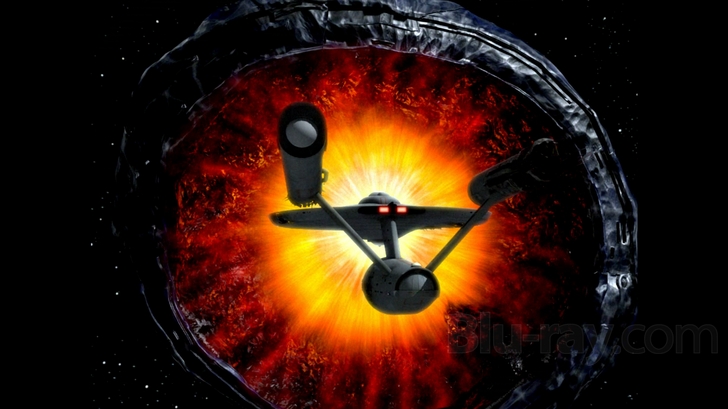
Season two of Star Trek is the best of the original series and, arguably, the most important in the franchise's long and illustrious history. Completing the cast by adding Pavel Chekov and debuting characters, setting trends, and introducing themes that would remain throughout the franchise's forty-year run, season two makes for must-see television even all these years after its original air dates and remains crucial to understanding the entirety of the Star Trek universe. Paramount has once again delivered a phenomenal Blu-ray release of an original series season. Equaling the quality found on the first season, season two makes for the perfect companion piece. It's a must-buy for Star Trek fans and whets the appetite for season three and, hopefully, every season of The Animated Series, The Next Generation, Deep Space Nine, Voyager, and Enterprise on Blu-ray. Star Trek: The Original Series -- Season Two receives my highest recommendation.
Other editions
Star Trek: The Original Series: Other Seasons

Star Trek: The Original Series: Season 1
1966-1967

Star Trek: The Original Series - Origins
1966-1986

Star Trek: The Original Series: Season 1
1966-1967

Star Trek: The Original Series - The Roddenberry Vault
1966-1969

Star Trek: The Original Series: Season 2
1967-1968

Star Trek: The Original Series: Season 3
1968-1969

Star Trek: The Original Series: Season 3
1968-1969
Similar titles
Similar titles you might also like

Star Trek: Enterprise: The Complete Series
Budget Re-release
2001-2005

Star Trek: The Next Generation - The Complete Series
Budget Re-release
1987-1994

Star Trek VI: The Undiscovered Country 4K
1991

Star Trek IV: The Voyage Home 4K
1986

Star Trek: First Contact 4K
1996

Star Trek: Generations 4K
1994

Star Trek: Insurrection 4K
1998

Star Trek: Voyager
1995-2001

Lost in Space 4K
Limited Edition
1998

Star Trek V: The Final Frontier 4K
1989

Star Trek II: The Wrath of Khan 4K
1982

Star Trek III: The Search for Spock 4K
1984

Star Trek: Nemesis 4K
2002

Star Trek: The Motion Picture 4K
The Director's Edition | Remastered
1979

Battlestar Galactica
The Remastered Collection
1978-1980

Star Trek 4K
2009

Star Trek: Picard - The Complete Series
2020-2023

Battlestar Galactica: The Complete Series
2003-2009

Star Trek: The Animated Series
1973-1974

Planet of the Apes
1968
